Tom Marsh undergoes dramatic transformation to play ‘The Elephant Man’
 Thomas Marsh stars in The Elephant Man, now on stage in the Foulds Theatre at the Alliance for the Arts. It’s a uniquely challenging role not only from a psychological perspective, but because of the physical demands it places on the actor.
Thomas Marsh stars in The Elephant Man, now on stage in the Foulds Theatre at the Alliance for the Arts. It’s a uniquely challenging role not only from a psychological perspective, but because of the physical demands it places on the actor.
Joseph Carey Merrick was severely deformed. His head and body were covered with patches of lumpy, grayish skin that looked like goiters or tumors. More than three times its normal size, his right hand was a useless club that more closely resembled a lobster claw than a human appendage. Because of the growths on his face and neck, his speech was so impaired that people either couldn’t understand him or were frightened by the sound of his voice.
But interestingly,  Marsh uses neither make-up, special effects nor prosthetics to replicate Merrick’s many deformities. Instead, he contorts his own face, arm and hand to suggest Merrick’s look and demeanor.
Marsh uses neither make-up, special effects nor prosthetics to replicate Merrick’s many deformities. Instead, he contorts his own face, arm and hand to suggest Merrick’s look and demeanor.
The transformation occurs on stage in full view of the audience in one of the play’s most memorable scenes.
When he was 17, Merrick wound up in a work house,  where he was beaten, verbally abused and humiliated daily. To escape this inhumane treatment, he secured a spot in a human curiosities show. When the show traveled to London, he met a doctor by the name of Frederick Treves (played by Scott Carpenter) who worked nearby at London Hospital. Treves persuaded Merrick to come to the hospital for an examination. Several months later, Treves presented Merrick and his findings to the Pathological Society of London.
where he was beaten, verbally abused and humiliated daily. To escape this inhumane treatment, he secured a spot in a human curiosities show. When the show traveled to London, he met a doctor by the name of Frederick Treves (played by Scott Carpenter) who worked nearby at London Hospital. Treves persuaded Merrick to come to the hospital for an examination. Several months later, Treves presented Merrick and his findings to the Pathological Society of London.
As Treves enumerates Merrick’s various deformities to the unseen attendees of the medical conference, Marsh assumes the physical attributes 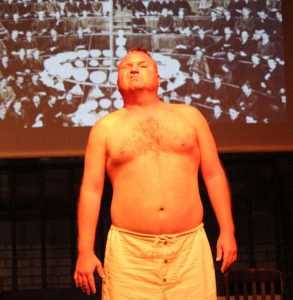 being described.
being described.
First, Marsh scrunches up his right cheek and eye, pulling up his lips so that he can only speak out of one side of his mouth. Next, he contorts his left hand into lifeless ball while cocking his head to the left and jutting out his right hip. Now completely out of balance, he’s handed a tall wooden staff to use as a cane or counterweight.
From this point on, Marsh maintains these facial features and physical attributes, which is no small feat.
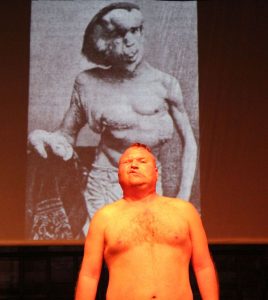 In fact, Marsh advises that the only way he can hold these positions and postures so long is by doing a lot of yoga breathing.
In fact, Marsh advises that the only way he can hold these positions and postures so long is by doing a lot of yoga breathing.
“It’s essentially like Lamaze,” Tom explains.
In spite of the breathing exercises, Marsh frequently experiences cramping as a result of talking out of one side of his mouth, keeping his face distorted and maintaining the physical posture of his right arm, hand and hip.
“It can be a bit difficult to work through a cramp or spasm while still getting my lines out,” he laughs good-naturedly. But that’s 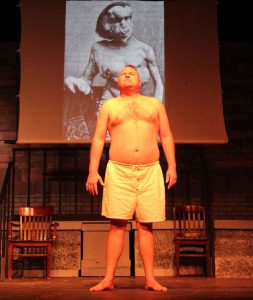 precisely what attracted him to the role.
precisely what attracted him to the role.
“I was looking for something more challenging than just becoming a character,” Tom adds with a knowing nod. “This particular production is never done with costumes or prosthetics. Never. It’s all up to the actor to portray the character through facial expressions and by distorting his body. But I didn’t realize that getting in tune with my body would be so challenging.”
When asked what he did to prepare for the role, he ponders his answer several seconds, not sure how much he cares to reveal.
 “I started by tying my right arm down with two belts as I was walking around the house so I would get used to it being non-functional,” he finally divulges. “I also played with the cane at home. It takes getting used to.”
“I started by tying my right arm down with two belts as I was walking around the house so I would get used to it being non-functional,” he finally divulges. “I also played with the cane at home. It takes getting used to.”
But sometimes the best decisions involve what we don’t do.
“I didn’t look at the pictures of Merrick,” Tom is quick to add. “I needed to make the character my own, rather than a caricature of Merrick. So [director] Rick [Sebastian] and I talked a lot about what I’d be feeling and what physical aspects I’d display at different points in the dialogue.”
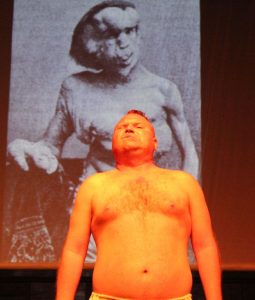 Marsh did not need sensitivity training to appreciate how people with disabilities or deformities are made to feel in their daily encounters with so-called normal folks. They stare. Refuse to make eye contact. Regard you with pity in their eyes. They patronize or pass judgment. Pat you on the head. Talk to the person you’re with instead of talking to you.
Marsh did not need sensitivity training to appreciate how people with disabilities or deformities are made to feel in their daily encounters with so-called normal folks. They stare. Refuse to make eye contact. Regard you with pity in their eyes. They patronize or pass judgment. Pat you on the head. Talk to the person you’re with instead of talking to you.
“I have a good friend who’s a paraplegic and another who can pretty much only use her hands,” Tom shares. But playing Merrick has given Marsh a whole new perspective on what his friends go through. Still, Marsh was struck by Merrick’s reaction 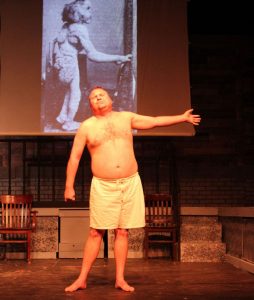 when Dr. Treves asked him to visit the hospital for further examinations following the presentation at the Pathological Society of London. He refused, later recalling that the experience made him feel like “an animal in a cattle market.”
when Dr. Treves asked him to visit the hospital for further examinations following the presentation at the Pathological Society of London. He refused, later recalling that the experience made him feel like “an animal in a cattle market.”
But Liza Jayne Longenhagen was also on Tom’s mind when the chance to play Merrick came his way.
“I saw her at Florida Rep as Helen Keller in The Miracle Worker and was gobsmacked,” Tom recollects.
And like Longenhagen, Marsh’s challenge with the role was to unleash 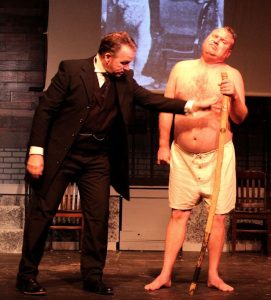 raw and deep emotions that he’d never been asked to deliver on stage, or anywhere else for that matter.
raw and deep emotions that he’d never been asked to deliver on stage, or anywhere else for that matter.
He pulls it off in impressive fashion. In fact, Marsh’s most evocative moments in the role are those in which he portrays the abandonment and alienation that Merrick experienced at various points in his life. He’s at his very best in the scenes during which his manager robs him of his live savings and abandons him in Belgium and where a female orderly runs off after getting a look at him while he’s seated in a bathtub.
But 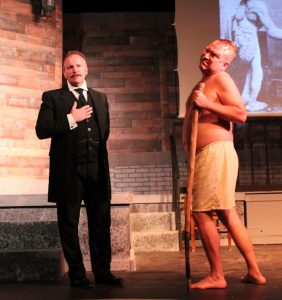 Marsh is equally effected during his character’s more tender moments, as where he’s befriended by actress Madge Kendal, who is the first woman aside from his mother to extend him her hand.
Marsh is equally effected during his character’s more tender moments, as where he’s befriended by actress Madge Kendal, who is the first woman aside from his mother to extend him her hand.
In conveying the quality and depths of Marsh’s performance in The Elephant Man, words are woefully clumsy substitutes for actually seeing him on stage. While The Elephant Man is admittedly not one of those feel-good uplifting holiday bromides, it is an example of good acting and good theater. It’s a production you really don’t want to miss.
RELATED POSTS.
Tom Marsh undertaking challenging role of ‘Elephant Man’ Joe Merrick















 Tom Hall is both an amateur artist and aspiring novelist who writes art quest thrillers. He is in the final stages of completing his debut novel titled "Art Detective," a story that fictionalizes the discovery of the fabled billion-dollar Impressionist collection of Parisian art dealer Josse Bernheim-Jeune, thought by many to have perished during World War II when the collection's hiding place, Castle de Rastignac in southern France, was destroyed by the Wehrmacht in reprisal for attacks made by members of the Resistance operating in the area. A former tax attorney, Tom holds a bachelor's degree as well as both a juris doctorate and masters of laws in taxation from the University of Florida. Tom lives in Estero, Florida with his fiancee, Connie, and their four cats.
Tom Hall is both an amateur artist and aspiring novelist who writes art quest thrillers. He is in the final stages of completing his debut novel titled "Art Detective," a story that fictionalizes the discovery of the fabled billion-dollar Impressionist collection of Parisian art dealer Josse Bernheim-Jeune, thought by many to have perished during World War II when the collection's hiding place, Castle de Rastignac in southern France, was destroyed by the Wehrmacht in reprisal for attacks made by members of the Resistance operating in the area. A former tax attorney, Tom holds a bachelor's degree as well as both a juris doctorate and masters of laws in taxation from the University of Florida. Tom lives in Estero, Florida with his fiancee, Connie, and their four cats.